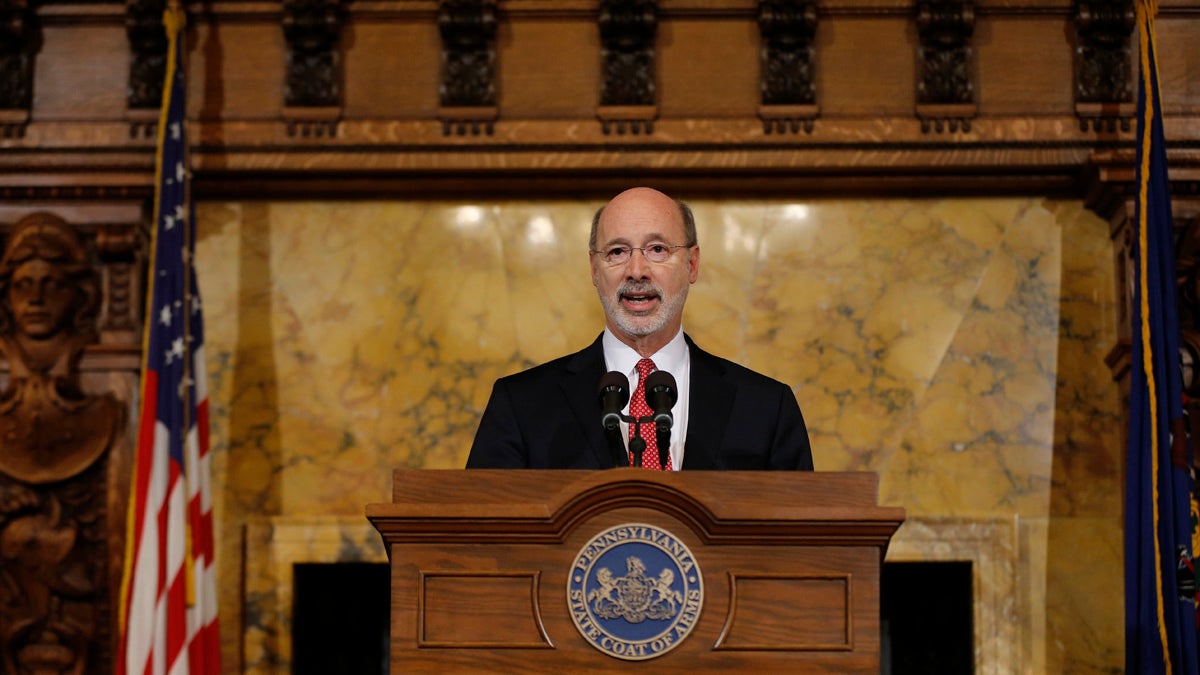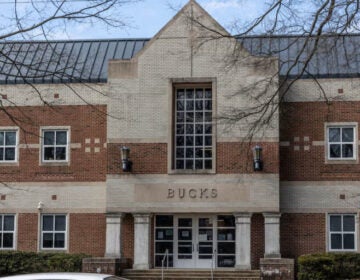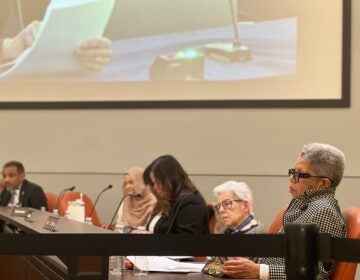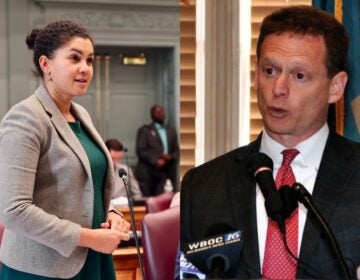Lashing out at lawmakers, Wolf sending billions to Pa. schools, social services
Listen
Pennsylvania Gov. Tom Wolf speaks with members of the media Tuesday at the state Capitol in Harrisburg. Wolf says he is rejecting parts of a $30.3 billion state budget plan that's already a record six months overdue, but he's freeing up more than $23 billion in emergency funding. (AP Photo/Matt Rourke)
Gov. Tom Wolf announced Tuesday that he’ll issue a line-item veto to reject major parts of the spending plan passed last week by Pennsylvania’s Republican-controlled House and Senate.
When the Legislature passed a similar budget over the summer, Wolf vetoed the entire package in an attempt to leverage support for the historic funding boost he sought for public education.
Nearly six months past the budget deadline, as schools have been pushed to the brink without any state aid, the governor agreed to sign off on most of the deal, but chastised lawmakers in harsh, insulting rhetoric.
“I’m expressing the outrage that all of us should feel about the garbage the Republican legislative leaders have tried to dump on us,” said Wolf, who called the Republican effort an exercise in “stupidity” and “futility.”
Wolf said he will veto the main budget line for public education because it falls well short of his goal to boost funding by $350 million.
Instead, he will release six months worth of state aid to schools to help keep their doors open and lessen their need to immediately seek additional loans or further deplete reserves.
Human service agencies would also receive half-year funding.
“We’re now at a point where I don’t want to hold the children of Pennsylvania hostage for the inability of folks here in Harrisburg to get the job done,” said Wolf at a press conference Tuesday.
Wolf said the budget hastily approved by the Legislature in the days preceding Christmas was not in balance and would leave the state with a $2.3 billion structural deficit.
Under that spending plan, community colleges and the state’s system of high education would not see a boost — and the appropriations bills for state-related universities were left undone.
“We still need a budget. We need one that actually adds up, this year. We need one that adds up next year. We need one that fully funds our schools. We need one that really covers the costs of our state,” said Wolf.
The budget Wolf signed includes a $30 million boost each for special education and early childhood education – figures that fall short of his goals.
“It is our sincere hope that the final budget agreement will increase those amounts to $50 million for both programs, including an additional $10 million for Head Start,” said state Budget Secretary Randy Albright.
Reaction
Education advocates across the state lauded Wolf’s decision to fund schools in the short term while continuing to push for systemic relief.
“This budget will provide some temporary relief, but we must be clear. It is simply inadequate,” said the Campaign for Fair Education Funding in a statement. “This budget does not put the state on a path toward ensuring that all students – no matter where they live – can succeed in meeting Pennsylvania’s academic standards.”
Others blasted Wolf for not employing the line-item veto earlier.
“Wolf held critical funding hostage — even over the Christmas holiday — in his ongoing push for higher taxes and more spending. Finally, the governor relented and freed these budget hostages — something he should have done half a year ago,” said Matthew Brouillette, president and CEO of the Commonwealth Foundation.
It’s still unclear exactly how the basic education subsidy will be distributed or how much individual districts can expect.
Through the protracted impasse, the School District of Philadelphia has had to borrow more than $500 million to stay afloat. Leaders estimate the district will be on the hook for $2.5 million in additional interest payments.
A few weeks ago, Superintendent William Hite said schools could be closed if a resolution weren’t reached by Jan. 29. And Wolf’s decision doesn’t necessarily mean schools can stay open the rest of the year.
“With only half of the state budget, it’s not likely that we could get through a full year, but we can go a lot longer than Jan. 29,” said Hite.
The district will still pursue the possibility of taking out additional loans, Hite said, adding that the cost of borrowing has skyrocketed due to the downgrading of state-backed debt.
Exit strategy?
Even with a partial budget passed, pressure remains on lawmakers to reach a final deal.
In addition to the incomplete school funding, Wolf vetoed parts of the budget with a specific eye on seeking leverage. For example, he shredded state support for the agriculture industry, which primarily affects rural Republican districts.
Still unclear, though, is how lawmakers will find enough votes to maneuver their priorities through the complex, fragile web of state politics. Since November, two separate “framework agreements” have fallen apart for lack of support among rank-and-file members of the Legislature.
Wolf will continue to insist on a $350 million boost to the main public education line item.
Senate Republicans will continue to insist on a pension bill that will reduce guaranteed benefits for future state employees and teachers – sparing taxpayers and local school boards from some of the risk in the stock market.
“This won’t get done without pension reform,” said Senate Majority Leader Jake Corman, R-Centre, in a teleconference Tuesday. “I know people are tired of hearing that, but that’s a key component to getting this finalized.”
Earlier in the month, the Senate passed a bipartisan pension bill that would provide future state employees and teachers with a hybrid retirement plan. Instead of solely getting a defined-benefit pension, half of an employee’s retirement would rest on defined contribution 401(k)-style plan.
If the other tentacles of the larger framework – which also included a provision that would allow beer and wine to be sold in supermarkets – move forward, Wolf promised to give the pension bill his blessing.
The House, though, couldn’t get it done. Every single Democrat voted against it, as did many Republicans – causing both sides to blame the other for the failure.
The Wolf administration now says the bill could — and should — have passed with the support of only Republicans, who control the chamber.
Moderate Republicans – many of whom crossed party leadership to support the larger spending pact agreed to by Wolf and passed by the Senate – were disappointed to find their Democratic counterparts unwilling to compromise on the pension bill.
“I’ve been there long enough to remember how painful it is to have to stick with your governor, because I was there during the Corbett years,” said Kate Harper, R-Montgomery. “The governor had agreed to pension reform, and the Democrats – to a man or a woman – all voted ‘no,’ which was a shocker.”
Harper blamed the bill’s failure on the influence of the state’s teachers unions.
“They lobbied hard against it, and they got all the Democrats and some of the suburban moderates to vote ‘no’ on pension reform because they’re afraid of them,” said Harper.
State Rep. Jim Roebuck, D-Philadelphia, dismissed that view. As minority chair of the House Education Committee, Roebuck said he felt no outside pressure. He hopes to see further input from Democrats on the pension bill, and he refused to acknowledge any link between the pension bill and the larger negotiations.
“I’m not sure the two are even comparable. You’re talking about two different parts of the agreement,” said Roebuck.
Parties also continue to disagree about how to actually pay for the increased education spending that Wolf seeks.
Sources say there was a consensus in the Senate for boosting funding by making more items eligible for sales tax. House Democrats would prefer to raise the state’s personal income tax.
House Republicans say they can’t garner support for any broad-based tax increase.
“It’s always easy to vote for more spending. The more difficult thing is: How are you going to pay for that more spending?” said Steve Miskin, spokesman for House Republicans.
Following Wolf’s announcement, Speaker of the House Mike Turzai, R-Allegheny, emailed members to say that they would remain out of session until at least Monday.
“We will continue to keep you updated in the coming days,” wrote Turzai. “Happy New Year to each and every one of you!”
WHYY is your source for fact-based, in-depth journalism and information. As a nonprofit organization, we rely on financial support from readers like you. Please give today.





